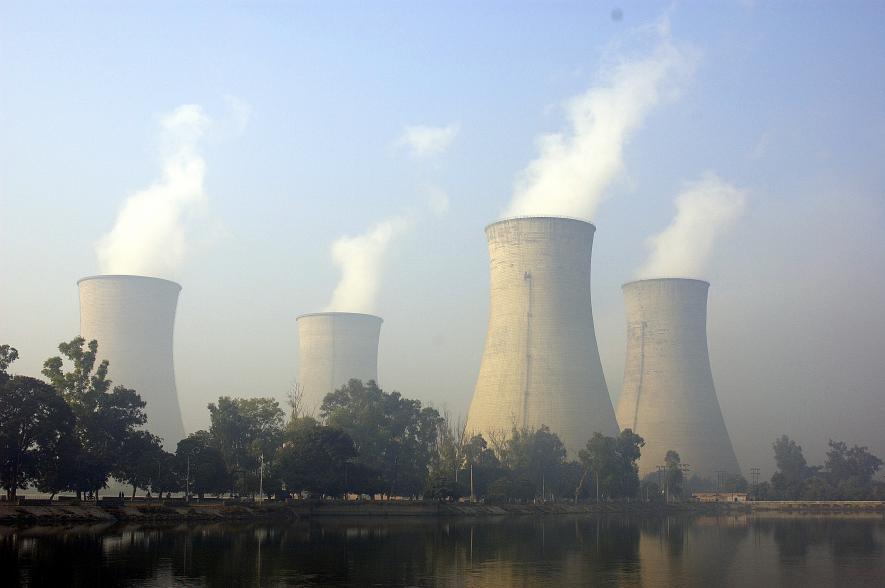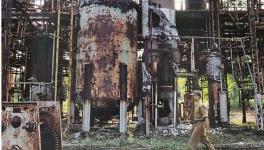Thermal Power Plants Miss Emissions Deadline Even as RBI Flags Concerns Over Climate Change

Representational image. | Image Courtesy: Wikipedia
New Delhi: Fossil-fuelled power plants in India, even those owned by the public sector, have lagged behind in limiting emission of harmful gases and particulate matter even as the Reserve Bank of India has raised concerns about climate change affecting the economy of the country. Several thermal power plants have already missed deadlines to install clean energy systems, that is, flue gas desulphurisation (FGD) equipment for reducing sulphurous emissions that are known to cause health and environmental hazards, till August 2020.
All thermal power plants across the country are expected to meet new emission standards latest by December 2022 in accordance with the Supreme Court guidelines and an order of the Central Pollution Control Board (CPCB). However, given the pace at which thermal projects have progressed in installing FGD equipment, this deadline will be missed in all likelihood.
A report published in August by the Central Electricity Authority (CEA) highlights that only four units, out of a total number of 448 thermal power units across the country, have so far successfully commissioned FGD projects. This works out to a mere 1,740 megawatts (MW) of the total installed capacity of 1,69,722 MW of thermal power in the country.
Not a single thermal power unit operated by any of the state governments has commissioned an FGD project so far.
“A number of thermal power plants are still in the bidding stage or tendering stage for installing FGD equipment. On an average, costs varying in the range of Rs 800 crore to Rs 1,200 crore are incurred on installing FGD equipment in any particular unit. Procuring of equipment is a time-consuming process after finalisation of bids. Given the past record of thermal plants in adhering to phase-wise timelines for meeting new emission standards, it is highly unlikely that the deadline of December 2022 will be met,” said environmental lawyer Ritwick Dutta.
The deadline of December 2022 had been set upon thermal power plants three years ago. The Union Ministry of Environment, Forests & Climate Change (MoEF&CC) had, through a notification issued in December 2015, initially set a two-year time period upon thermal power plants to achieve new emission standards. However, the CPCB had extended this deadline by five years in December 2017 after most thermal power plants failed to achieve the standards within the initial time period. Depending on their respective years of commissioning and installed capacities, different thermal power projects were then given different timelines till December 2022 for achieving the emission standards.
Also read: Power Tariff Hike: UP Powerloom Weavers Plan Indefinite Strike From Sept 1
Out of the 11 thermal power plants operating in the National Capital Region (NCR) all, but one, have missed the deadline of December 2019 for installing FGD equipment. As per another CEA report that had been published in February 2020, operation of FGD equipment has commenced only in the 2X660 MW Mahatma Gandhi Super Thermal Power Plant in Jhajjar district of Haryana. Work was either in progress, bids were yet to be finalised or retendering was to be done in other plants in the NCR at the time when CEA had published the report in February.
Private players operating thermal power plants in India have already appealed for an extension in deadline for installation of FGD equipment, which is an indicator of their lack of total commitment towards restricting emissions. In a letter to the Prime Minister’s Office (PMO) through the Federation of Indian Chambers of Commerce & Industry in July, privately-owned thermal power plants demanded an immediate extension in timelines for FGD installation and commissioning besides waiving off of penalties for those projects that have missed their deadlines.
“Only 1% of the installed capacity of thermal power considered under the phasing plan have commissioned FGD equipment so far. Bids have been awarded for another 27% installed capacity. Bids have not even been awarded for the remaining 72% capacity,” added Dutta.
Private players have also cited a recent order requiring ‘prior approval’ from the Union Ministry of Power in order to import equipment from certain countries as another roadblock towards installing FGD equipment. Most of the FGD equipment is procured from outside India, the letter states.
At the same time, there seems to be a broad consensus amongst experts that per unit costs of electricity will definitely increase by at least Rs 0.30 to Rs 0.40 for recovering capital expenditure incurred in the installation of FGD equipment. This additional cost, which will be ultimately burdened by the consumer, is likely to push up inflation.
“The fact is that most of the existing power plants were never designed for installing FGD equipment anytime in the future. They simply don’t have the space to install additional equipment within their premises. Any retrofitting will involve detailed planning and redesigning which is a process that can spread anywhere between 18 months and 30 months. Production also needs to be suspended to undertake this work. Thermal power plants are short of financial resources in any case and cannot afford this exercise,” said RK Sachdev, a former advisor to the Union Coal Ministry.
Besides, opinion is also divided on the necessity, if at all, of FGD equipment in thermal power plants because domestically-produced coal in India has as less as 0.4 per cent sulphur content. Usage of domestically produced coal in thermal power plants of India is also set to increase in the near future, particularly after the central government allowed private players into commercial coal mining by putting up 41 blocks for auction in June. Power plants are expected to immediately substitute 120 million tons of coal imports with domestically produced coal, in order to cut costs of production, with the commencement of mining operations in these 41 blocks. Besides, Coal India Limited (CIL) which has a substantial inventory with it has also reached out to thermal power plants to make available domestic coal for substituting imports.
“With many power plants to be phased out over the next 10 to 15 years, it will be a waste of resources to install expensive FGD equipment in all projects particularly because Indian coal is low in sulphur content. Rather, each site should be studied separately to find out if ambient pollution in terms of sulphurous emissions is of real concern before installation of FGD equipment is made compulsory,” added Sachdeva.
Queries regarding the proposal, if any, to extend the December 2022 deadline as well as possible availability of alternative technology to contain harmful emissions, have been sent to the Union Power Ministry and the CPCB on behalf of NewsClick. These emails are yet to elicit any response. As per reports, the central government is yet again thinking of extending deadlines beyond December 2022.
As far as the public sector is concerned, only two out of the 315 state-owned thermal power plants have commissioned FGD equipment so far according to the CEA report. Both the power plants belong to the central government.
In RBI’s annual report for the financial year 2019-20 which was released last week, it has been noted that in recent years, the impact of climate change in terms of volatile rainfall intensity, increase in extreme events and rising temperature has implications for the outlook of agriculture. The apex bank has further noted in the report that environmental, social and government (ESG) factors ascertain the long-term sustainability of firms in the face of environmental vulnerabilities such as climate change risks that negatively impact the financial sector.
“The fallout could include significant deterioration of asset quality of borrowers in affected geographical zones; the impact on business models due to governmental/ societal response to climate change; increase in claims due to natural calamities, with implications for the profitability of insurance firms; and long-term liquidity effects,” states the RBI report.
Also read: Adani to Acquire 50.5% GVK Stake in Mumbai Airport, Become India’s Largest Private Operator
The writer is an independent journalist.
Get the latest reports & analysis with people's perspective on Protests, movements & deep analytical videos, discussions of the current affairs in your Telegram app. Subscribe to NewsClick's Telegram channel & get Real-Time updates on stories, as they get published on our website.
























